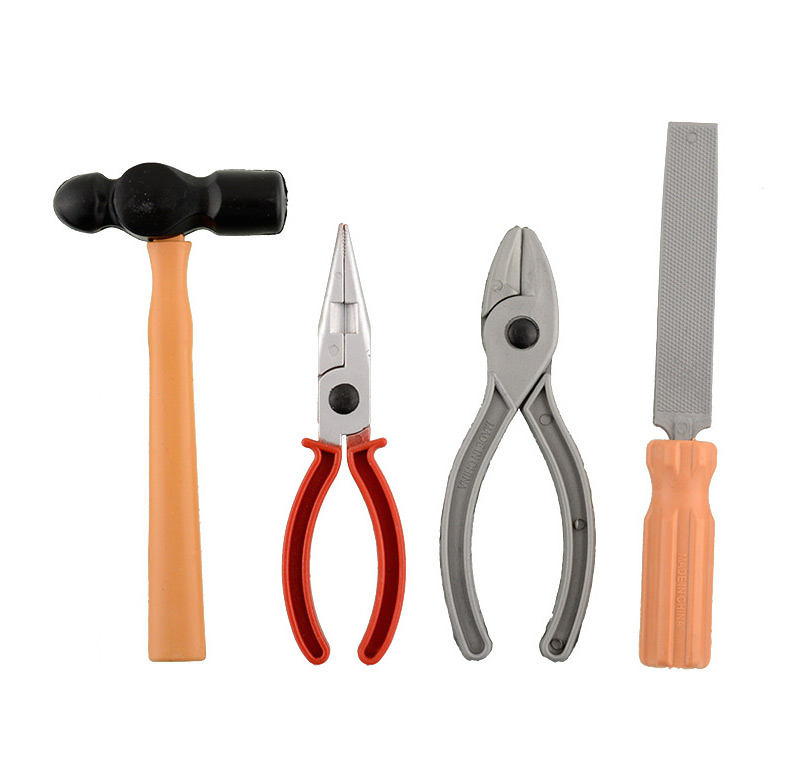
4 Tools That Can Spectacularly Improve Your Kids’ Cooperation (And Your Sanity)
Not just dads, but moms too, need plenty of tools in their parenting toolbox. With the right tools, things click more easily into place. Coercion is not needed.
Nothing can drive us parents more insane than when, hour after hour, our kids don’t do the things we’re telling them to do or not do. For example, those parents of school-going age, you know how hard it is to simply get them out the door.
But how do we get our kids to work with us not against us? Of course, we need to skillfully exercise loving authority over our children – giving calm commands – especially strong-willed children. But if the power-tool of authoritarian demand is the only tool in our parenting toolbox, we’re in for a lot of trouble.
Five kids in tow, I have been determined to bolster the rare quality of tractability in my kids. In fact a few weeks ago I wrote a post entitled, 20 Ways to Enlist your Child’s Co-operation. I listed twenty tools in one post – I urge you to give that a read, and get those tools.
I wrote that post for myself, because our kids at that time were as non-co-operative as cats. Just in time, because a recent week with Julie away would have killed me if I didn’t have some of those handy.
Since then I have reflected and read more on the subject. I realized I missed out 7 other tools of critical importance – most of them more important than all 20 in the post before!
In this post I will mention four of them, and in the next post the final three.
Tool One: Role-plays.
Through fun role plays, give them some experience in getting co-operation right.
I am grateful to PJ and Ashley Smythe who shared this insight in their manual, ‘Quick Start Parenting’.
Children learn best not by being disciplined when they get it wrong, but by being coached in the moment when they are about to get it wrong, but you intercept the moment and guide them to get it right.
Read that again if you must – it spits in the face of parenting that sees discipline as the pivot of good parenting. Of course correction (when done correctly) is critical, but just-in-time coaching in my view has better results – because once they get it right, they are more likely to get it right again.
The problem is that most times we don’t realize that they’re about to get it wrong. There is a solution: create fun role play scenarios with your kids – where they experience the feeling of getting it right in a manufactured scenario. They are then more likely to get it right in real-life.
As an example of this, the other day we told our three older kids we’re playing the, ‘How quick can you listen?’ game. First Julie and I showed them how the game works. I told Julie to pretend she is walking to go get a banana in the kitchen. With her back to me, I said ‘Stop Julie.’ She grinded to a halt. ‘Come here please.’ She did so with a smile on her face. ‘Would you go get my car keys please?’ Happily she complied. ‘Anything else?’ she asked me on her return.
Each child was eager to match Julie’s sterling abilities. Each child had several turns. And their speed of listening and enthusiasm seemed to increase turn on turn.
I know it seems so fake. But it works. Ask NASA astronauts. They will tell you that practicing in the virtual world is the best way to prepare for the real one. Each time an astronaut or, in our case, a child gets it right, some synaptic pathway is more deeply etched into their brain, increasing their chances of getting it right the next time.
Tool Two: Pep-talks.
Use pep talks to communicate your expectations regarding co-operation.
In my friend, Jaci Mungavin’s book, ‘Purposeful parenting’, she reminds us that ‘a good coach doesn’t bomb on the team after a bad game for things that he never mentioned they should avoid. Rather he helps them to achieve success by preparing them for the various scenarios they’re likely to face, clearly communicating his expectations.’
When Jaci takes her kids to the shops (brave!!!) she spends a minute in the car providing them with a pep-talk: ‘Remember what I told you before? In the shops we stay close to each other. You don’t touch anything – it might help to keep your hands in your pockets. Don’t nag me for anything – if I want to buy a treat for you I will, but I won’t want you to ask for anything.’
When Jaci and Richard arrive at a house for a meal they might say, ‘We’re guests here so we need to respect their home and watch them to see what’s allowed in their house. No jumping on couches. Remember the people’s names are Shar and Louis, and their children are Jake and Johnny. I want you to look at people’s faces with a friendly smile and say ‘hello’ to everyone. When it’s time to go, I want you to say, ‘Okay.’ And I want you to say bye to everyone and also to say to Shar and Louis, ‘Thanks for everything!’
See, they’re raising the bar, clarifying the win for their kids.
Thanks to their tip-off, Julie and I have done this a lot. To be honest, we have not found much luck in getting our kids to always smile or look into eyes, but in other ways it has worked. They do need reminders along the way, of course. When we’re back in the car, we are like the coach who affirms what they got right. We also mention what they need to do better next time – none of which comes as a surprise to them, because we were clear on what we expected.
Tool Three: Empathy.
When your child responds badly to your directive, show empathy.
I have written about ‘responsive listening’ before. The idea is that rather than reacting to your child’s negative response with negative motion myself (‘You will do what I say!’ ‘Because I told you!’ ‘I’m not interested in your feelings about this!’), which only throws fuel on the fire of their reaction, I should respond with a listening ear and with some empathy. It is counter-intuitive, but it usually works like a charm – both in making you a kinder parent as well as defusing some of the resistance in your child.
Responsive listening follows three steps:
1.Listen to what they’re saying – their feelings, wishes and opinions. For whatever reason, your child really wants to play with this toy now, or wants to stay longer at their friend, or wants to go to that sleepover, or wants to watch the end of the movie, or doesn’t want to eat or bath now. They feel strongly about this. Realize their feelings and wishes are valid, even if their preferred path or behaviour is not timeous or best.
2.Gently reflect back to them what they’re feeling or saying. ‘You seem to feel you’ve been treated unfairly by me.’ ‘You were so excited about swimming / playing longer / watching longer / coming with me / that sleepover and now you’re frustrated / disappointed.’ ‘You feel you deserved that sweet.’ ‘I realize you don’t feel like climbing in the car / doing homework / sleeping / supper.’
3.Pause and then announce your final instruction or decision. The purpose of your listening and empathy is not to enter into negotiations, but rather to provide an outlet for your child’s negative emotions. So, after listening, pause and make your final ruling. Here are some examples: ‘You’re loving playing with that toy. (Pause) However, it’s time to put it down and come bath.’ ‘Your brother is really irritating you, I know how that feels. (Pause) However, it’s never okay to hit him.’ Then look or walk away, the matter is decided. Notice that there’s no need to give reasons.
William Nichols in his book, ‘Stop arguing with your kids’ explains: ‘Responsive listening won’t make a seven-year-old want to go to bed on time or a teenager feel good about missing a movie with his friends. But having their feelings heard and acknowledged will make them feel less unfairly treated. In the process, the battle of wills is won. But not by surrendering yours, but by making your child feel heard.’
Tool Four: Patience.
See their lack of co-operation as a chance to develop your patience.
We tend to put so much energy into controlling situations and others that many of us forget to grow in self-control.
A time-tested biblical proverb puts it like this: ‘Better to be patient than powerful; better to have self-control than to conquer a city’.
Parenting does more than develop character in our child. It develops character in us parents. In fact our child is a tool that can shape who we are becoming, if we let them.
What kind of character might I form in parenting? There’s empathy. There’s unconditional love. And let us not forget … patience!
Patience is the ability to fill the seconds and minutes of being slowed down by young lives with meaning, with breathing more deeply, with self-control and calm.
Breaking away from the tool metaphor, our homes are not factories where inanimate parts function together for optimal efficiency. No, they are families of loving people, each with their own set of wishes and desires. Lack of co-operation in our kids is an inevitable result of distinct personhood.
Impatience manifests in barks of anger, demands or threats. In this way it actually works against our child’s co-operation over time.
First, it models to our kids that if they want something they must get angry. Second, it teaches them to ignore your earlier non-bark directives. They come to see every instruction given before daddy or mommy starts snorting as one to be ignored. They think, ‘When dad gets angry, then I will listen.’ This only serves to reduce your future attempts at acquiring their co-operation!
‘But I can’t help losing it with my kids. My kids drive me crazy.’
I have told myself this lie too. But we can control our impatience and our anger. We must. Auschwitz-surviving psychologist Victor Frankl reminds us that between the stimulus (our child’s non-compliance) and our response (to shout or to stay calm) is a small gap, called free will.
Patience is a choice, a choice that needs to be made in the millisecond of a moment our child stalls or disobeys us.
What is patience? It is choosing to co-operate with what life brings to us, rather than trying to coerce it. It is the choice to accept the delay, to seize the pause that has come our way, It also slowly but surely frees us from our dehumanizing addiction to productivity and control.
Impatience on the other hand is violence against the present moment. It forgets that it is not just my child, but I who am being shaped.
When frustration starts to rise, much better to take control of myself. Try to take a deep breath, smile and wait for this child. Like all the people in years gone by have waited for you.
In the long-run not only will you reduce your stress-levels, but your child will likely respond to you more quickly.
Let’s look at these tools again.
Power-tools one and two (Role-plays and Pep-talks) are preparatory by nature. We set our children up to succeed in co-operation. First by giving them practice in getting it right in the form of fun role plays. Next by clearly communicating what we expect just before they give it a go.
Power-tools three and four (Empathy and Patience) are in-the-trenches. Perhaps our child responds in a fiery way to our directive. In that case we choose to throw water not oil on their response – by showing empathy. And when our child, either deliberately or just because they don’t carry our sense of urgency, slows us down, we choose to breathe rather than bark, to control ourself rather than redoubling our efforts to control them.
Four great tools. Add them to your toolbox. Then put them to use.
And be sure to come back for my next post where I speak of 3 other research-based tools to help our kids work with not against us.
Comments
Also published on Medium.




